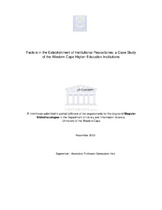| dc.description.abstract | In the academic world, open access institutional repositories (IRs) are beginning to play a vital role in storing and disseminating scholarly communication. Through this method, higher education institutions are able to showcase their intellectual outputs and to contribute to sharing and building knowledge. This evolutionary process of scholarly communication is an important feature of knowledge societies.Furthermore, IRs allow scholars to make known the research they are involved in,which can result in their academic reputation improving, as well as the reputations of
the institutions they represent.The purpose of this study is to examine the processes of establishing IRs in the four tertiary education institutions in the Western Cape, which form part of the Cape Higher Education Consortium (CHEC). Within this consortium is the collaborative library project, the Cape Library Consortium (CALICO), which represents the four
academic library services. The researcher investigated whether the four Western Cape Higher Education Institutions have established IRs and their experiences in doing so. They are examined in the light of the guidelines for successful IRs already established in the international professional literature on IRs. Throughout the study,the partnerships that are needed for the success of IRs, with a specific emphasis on the crucial role that the librarian might play in this regard, are a central focus.The study is a qualitative case study, relying on interviews with key informants from
the four HEIs and analysing policy and other supporting documents. The study confirms comment in the literature that IRs evolve in “messy” and “spotty” ways. The key findings might be summarised in the form of four assertions:• “It is all about people”• Philosophical differences are significant
• Context and history cannot be ignored • The role of the university library is ambiguous.It is hoped that the study of fledgling IR projects might provide insights useful to the broader IR research and professional literature. | en_US |

